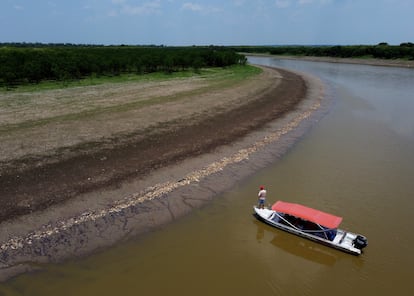Unprecedented Amazon drought was primarily caused by climate change, not El Niño, study finds
Researchers concluded that these types of extreme weather events could occur up to once every 15 years if the Earth’s temperature continues to rise


Last year’s unprecedented drought in the Amazon led to the lowest river levels in 120 years. Manaus and 20 other Brazilian cities declared a state of emergency due to the low availability of water, and the region of Lake Tefé gained worldwide attention because of the deaths of over 100 dolphins. It was a climatic catastrophe. Several villages were cut off because the rivers used for transportation dried up, and in other countries such as Peru and Colombia, there were alerts due to fish mortality caused by high temperatures.
At the time, the question arose as to how much the El Niño phenomenon and climate change had to do with this extreme event. Who was to blame? The suspicion was that it was a combination of both. Now, a study by the World Weather Attribution (WWA) initiative, in which scientists from Brazil, the Netherlands, the United Kingdom and the United States participated, provides a definite answer: climate change, and not El Niño, was the main cause of the exceptional drought experienced in the Amazon basin between June and November 2023.
Brazilian Regina Rodrigues, a professor at the Federal University of Santa Catarina and one of the co-authors of the study, explains that the definition of a drought involves several elements. There is meteorological drought, for example, in which only low precipitation or lack of rainfall is taken into account for analysis. “In this case, we found that both El Niño and climate change played a role in the Amazon drought, something like 50% and 50%.” But there is also what is known as agricultural drought, where, in addition to rainfall, evapotranspiration is considered. “If there is a lot of evaporation, the climate will be drier. And since evaporation is closely related to high temperatures, under this definition of drought we did find that it was climate change that played a greater role,” says the expert. “In a colder climate, such a drought would be extremely rare,” the researchers point out.
The study, like some 50 others conducted by WWA to understand how climate change has influenced the intensity and probability of an extreme weather event, uses a peer-reviewed methodology that is applied each time the event is analyzed. In short, as Rodrigues explains, the modeling looks at what would happen to a phenomenon (such as drought) if the amounts of carbon dioxide that have accumulated in the atmosphere since the pre-industrial era had never been emitted. “Then we compare this data statistically with what we see now, and even with the future climate.”
Thus, for example, the researchers concluded that, under the current climate, the probability of such a meteorological drought in the Amazon is one in every 100 years, while for agricultural drought the scenario changes to one in every 50 years. However, under a possible climate scenario in which the planet’s average temperature does not increase by more than 2°C compared to pre-industrial levels (the plan B of the Paris Agreement, the primary goal of which is not to exceed 1.5°C), the probability of a meteorological drought in the Amazon would become one every 30 years approximately, while for agricultural drought the risk is one every 10 to 15 years. In short, these would be more frequent and more likely scenarios in the face of a warmer planet.
This study provides a warning for the Amazon countries to prepare for a future that is becoming less and less uncertain and, at the same time, highlights the probability that weather events will indeed become more extreme.
Sign up for our weekly newsletter to get more English-language news coverage from EL PAÍS USA Edition
Tu suscripción se está usando en otro dispositivo
¿Quieres añadir otro usuario a tu suscripción?
Si continúas leyendo en este dispositivo, no se podrá leer en el otro.
FlechaTu suscripción se está usando en otro dispositivo y solo puedes acceder a EL PAÍS desde un dispositivo a la vez.
Si quieres compartir tu cuenta, cambia tu suscripción a la modalidad Premium, así podrás añadir otro usuario. Cada uno accederá con su propia cuenta de email, lo que os permitirá personalizar vuestra experiencia en EL PAÍS.
¿Tienes una suscripción de empresa? Accede aquí para contratar más cuentas.
En el caso de no saber quién está usando tu cuenta, te recomendamos cambiar tu contraseña aquí.
Si decides continuar compartiendo tu cuenta, este mensaje se mostrará en tu dispositivo y en el de la otra persona que está usando tu cuenta de forma indefinida, afectando a tu experiencia de lectura. Puedes consultar aquí los términos y condiciones de la suscripción digital.








































